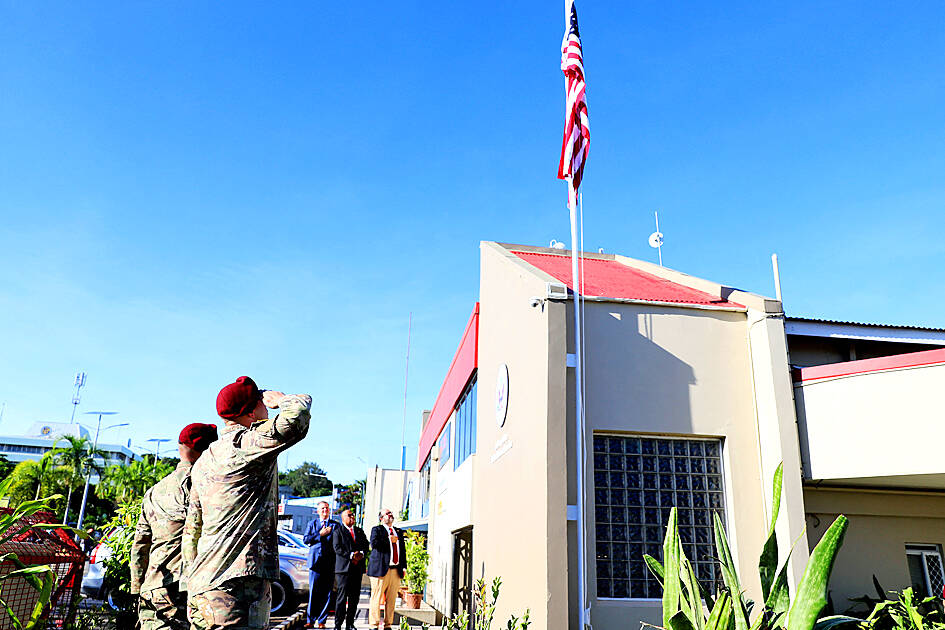The US yesterday opened an embassy in the Solomon Islands in its latest move to counter China’s push into the Pacific.
The embassy in the capital, Honiara, is starting small, with a charge d’affaires, a couple of US Department of State staff and a handful of local employees.
The US had operated an embassy in the Solomon Islands for five years before closing it in 1993 as part of a global reduction in diplomatic posts after the end of the Cold War.

Photo: AFP
However, China’s bold moves in the region have the US seeking to increase its engagement in a number of ways, such as by donating COVID-19 vaccines, bringing back Peace Corps volunteers to several island nations, and investing in forestry and tourism projects.
“The opening of the embassy builds on our efforts not only to place more diplomatic personnel throughout the region, but also to engage further with our Pacific neighbors, connect US programs and resources with needs on the ground, and build people-to-people ties,” US Secretary of State Antony Blinken in a statement.
The opening comes as Fijian Prime Minister Sitiveni Rabuka appears to be reassessing some aspects of his nation’s engagement with Beijing. Rabuka last week told the Fiji Times that he plans to end a police training and exchange agreement with China.
The state department notified Washington lawmakers early last year that China’s growing influence in the region made reopening the Solomon Islands embassy a priority.
Since then, the Solomons has signed a security pact with China, raising fears of a military buildup in the region, and the US has countered by sending several high-level delegations.
The Solomon Islands switched allegiance from Taiwan to Beijing in 2019, threatening close US ties that date to World War II.
“We are seeing this bond weaken as the People’s Republic of China aggressively seeks to engage Solomon Islands’ political and business elites, utilizing a familiar pattern of extravagant promises, prospective costly infrastructure loans and potentially dangerous debt levels,” the department wrote in a notice to US Congress in December that was obtained by The Associated Press.
Washington had been encouraged by the Solomon Islands’ commitment to continue working with traditional security partners such as Australia and the US, but remains concerned about the secrecy surrounding the security agreement with China, a senior state department official said on condition of anonymity.
He said any type of militarization in the Pacific by China would be a great concern.
The official said the US has not yet had deep conversations with the new Fijian leadership, so it is too early to know if the move on policing signaled a change in direction for Fiji on China.

The CIA has a message for Chinese government officials worried about their place in Chinese President Xi Jinping’s (習近平) government: Come work with us. The agency released two Mandarin-language videos on social media on Thursday inviting disgruntled officials to contact the CIA. The recruitment videos posted on YouTube and X racked up more than 5 million views combined in their first day. The outreach comes as CIA Director John Ratcliffe has vowed to boost the agency’s use of intelligence from human sources and its focus on China, which has recently targeted US officials with its own espionage operations. The videos are “aimed at

STEADFAST FRIEND: The bills encourage increased Taiwan-US engagement and address China’s distortion of UN Resolution 2758 to isolate Taiwan internationally The Presidential Office yesterday thanked the US House of Representatives for unanimously passing two Taiwan-related bills highlighting its solid support for Taiwan’s democracy and global participation, and for deepening bilateral relations. One of the bills, the Taiwan Assurance Implementation Act, requires the US Department of State to periodically review its guidelines for engagement with Taiwan, and report to the US Congress on the guidelines and plans to lift self-imposed limitations on US-Taiwan engagement. The other bill is the Taiwan International Solidarity Act, which clarifies that UN Resolution 2758 does not address the issue of the representation of Taiwan or its people in

US Indo-Pacific Commander Admiral Samuel Paparo on Friday expressed concern over the rate at which China is diversifying its military exercises, the Financial Times (FT) reported on Saturday. “The rates of change on the depth and breadth of their exercises is the one non-linear effect that I’ve seen in the last year that wakes me up at night or keeps me up at night,” Paparo was quoted by FT as saying while attending the annual Sedona Forum at the McCain Institute in Arizona. Paparo also expressed concern over the speed with which China was expanding its military. While the US

SHIFT: Taiwan’s better-than-expected first-quarter GDP and signs of weakness in the US have driven global capital back to emerging markets, the central bank head said The central bank yesterday blamed market speculation for the steep rise in the local currency, and urged exporters and financial institutions to stay calm and stop panic sell-offs to avoid hurting their own profitability. The nation’s top monetary policymaker said that it would step in, if necessary, to maintain order and stability in the foreign exchange market. The remarks came as the NT dollar yesterday closed up NT$0.919 to NT$30.145 against the US dollar in Taipei trading, after rising as high as NT$29.59 in intraday trading. The local currency has surged 5.85 percent against the greenback over the past two sessions, central